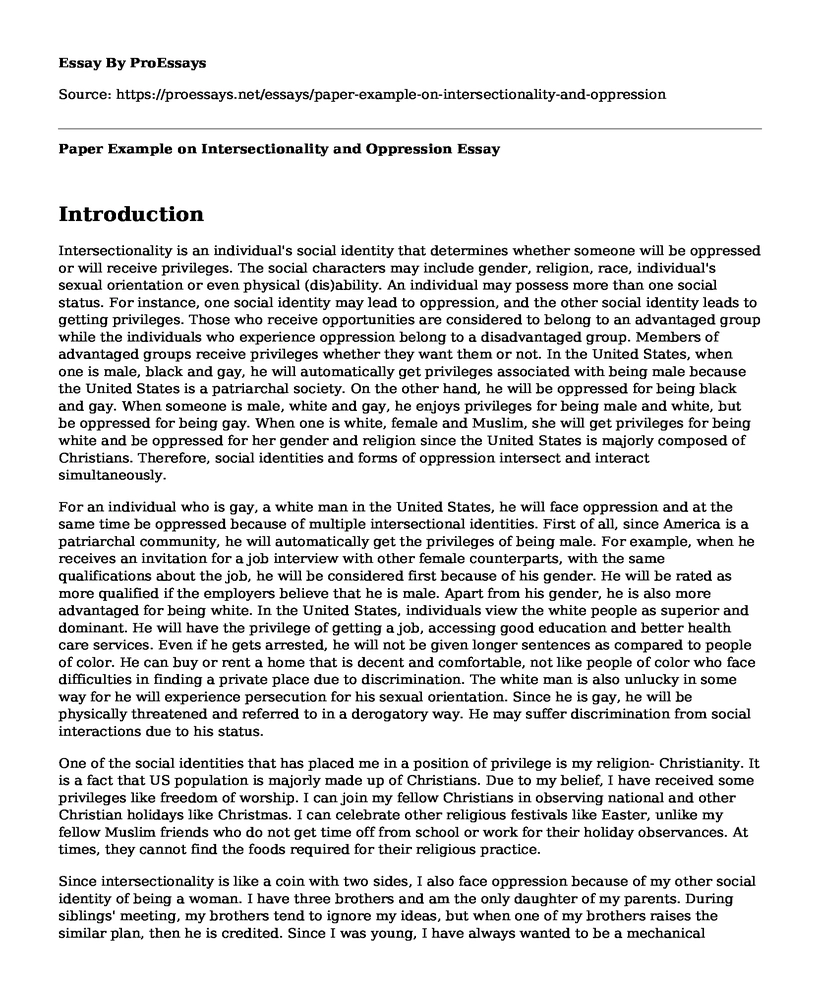Introduction
Intersectionality is an individual's social identity that determines whether someone will be oppressed or will receive privileges. The social characters may include gender, religion, race, individual's sexual orientation or even physical (dis)ability. An individual may possess more than one social status. For instance, one social identity may lead to oppression, and the other social identity leads to getting privileges. Those who receive opportunities are considered to belong to an advantaged group while the individuals who experience oppression belong to a disadvantaged group. Members of advantaged groups receive privileges whether they want them or not. In the United States, when one is male, black and gay, he will automatically get privileges associated with being male because the United States is a patriarchal society. On the other hand, he will be oppressed for being black and gay. When someone is male, white and gay, he enjoys privileges for being male and white, but be oppressed for being gay. When one is white, female and Muslim, she will get privileges for being white and be oppressed for her gender and religion since the United States is majorly composed of Christians. Therefore, social identities and forms of oppression intersect and interact simultaneously.
For an individual who is gay, a white man in the United States, he will face oppression and at the same time be oppressed because of multiple intersectional identities. First of all, since America is a patriarchal community, he will automatically get the privileges of being male. For example, when he receives an invitation for a job interview with other female counterparts, with the same qualifications about the job, he will be considered first because of his gender. He will be rated as more qualified if the employers believe that he is male. Apart from his gender, he is also more advantaged for being white. In the United States, individuals view the white people as superior and dominant. He will have the privilege of getting a job, accessing good education and better health care services. Even if he gets arrested, he will not be given longer sentences as compared to people of color. He can buy or rent a home that is decent and comfortable, not like people of color who face difficulties in finding a private place due to discrimination. The white man is also unlucky in some way for he will experience persecution for his sexual orientation. Since he is gay, he will be physically threatened and referred to in a derogatory way. He may suffer discrimination from social interactions due to his status.
One of the social identities that has placed me in a position of privilege is my religion- Christianity. It is a fact that US population is majorly made up of Christians. Due to my belief, I have received some privileges like freedom of worship. I can join my fellow Christians in observing national and other Christian holidays like Christmas. I can celebrate other religious festivals like Easter, unlike my fellow Muslim friends who do not get time off from school or work for their holiday observances. At times, they cannot find the foods required for their religious practice.
Since intersectionality is like a coin with two sides, I also face oppression because of my other social identity of being a woman. I have three brothers and am the only daughter of my parents. During siblings' meeting, my brothers tend to ignore my ideas, but when one of my brothers raises the similar plan, then he is credited. Since I was young, I have always wanted to be a mechanical engineer. When I tried to tell my father that I want to study mechanical engineering in university, he gave me a look that expressed his shock. He told me to research something easy because engineering is a challenging career meant for males. I ended up studying journalism. But something that saddens me is that my elder brother studied the same course that I initially wanted. It is oppression as I am overlooked because of my gender. Females are always considered to be weak and inferior human beings.
Conclusion
Finally, I will apply the knowledge of my intersectionality by recognizing that people experience the world differently based on their social identities. Embracing other people's differences will be my priority. I will stop to stereotype people like the LGBT to their group, but instead, I will encourage them not to feel oppressed because everyone experiences oppression in one way or another.
Definitions and Synonyms
Oppression - Persecution
Privilege - Advantage
Patriarchal - A system of community controlled by men.
Misogyny - Intense prejudice against women.
Cite this page
Paper Example on Intersectionality and Oppression. (2022, May 02). Retrieved from https://proessays.net/essays/paper-example-on-intersectionality-and-oppression
If you are the original author of this essay and no longer wish to have it published on the ProEssays website, please click below to request its removal:
- A Fight I Had With My Dad Essay Example
- Impact of Single Parenthood on a Child's Development - Research Paper
- Is Poverty a Crime? Examining Barbara Ehrenreich's NYT Piece
- Critical Essay: Eva Derzic's Perspective on Communication
- 9/11: US Policy Shifts After Terror Attack - Essay Sample
- Paper Example on Educational Technology: Empowering Individuals to Live Better in Society
- Essay Sample on The Power of Media: Influencing Consumer Purchases







